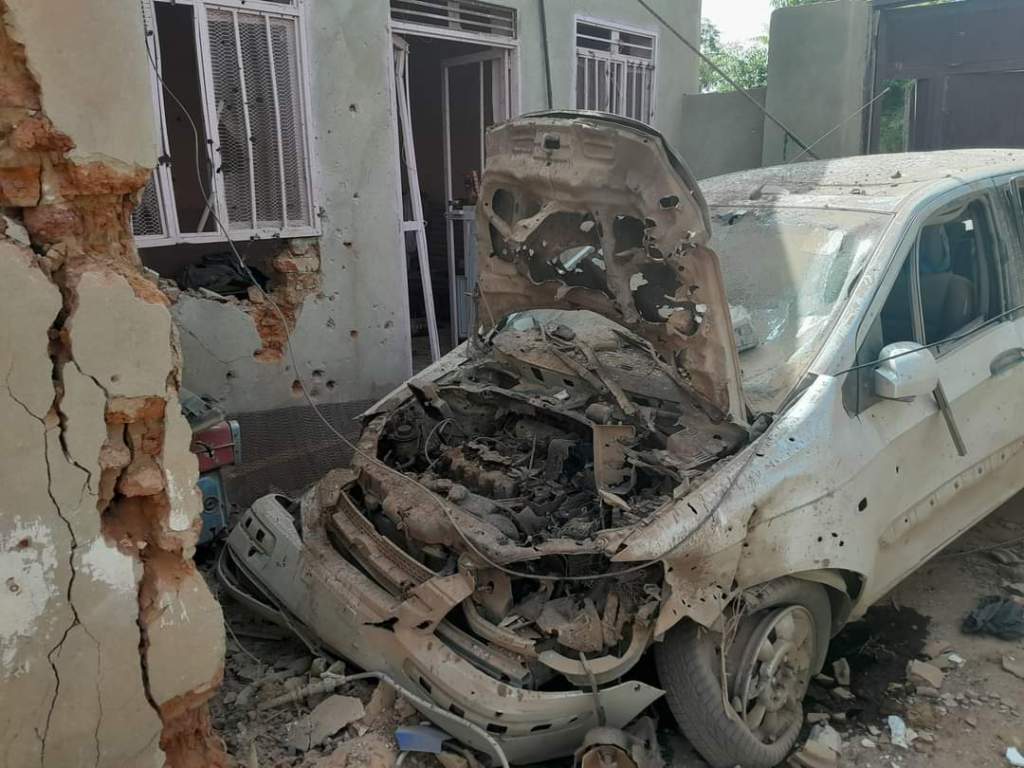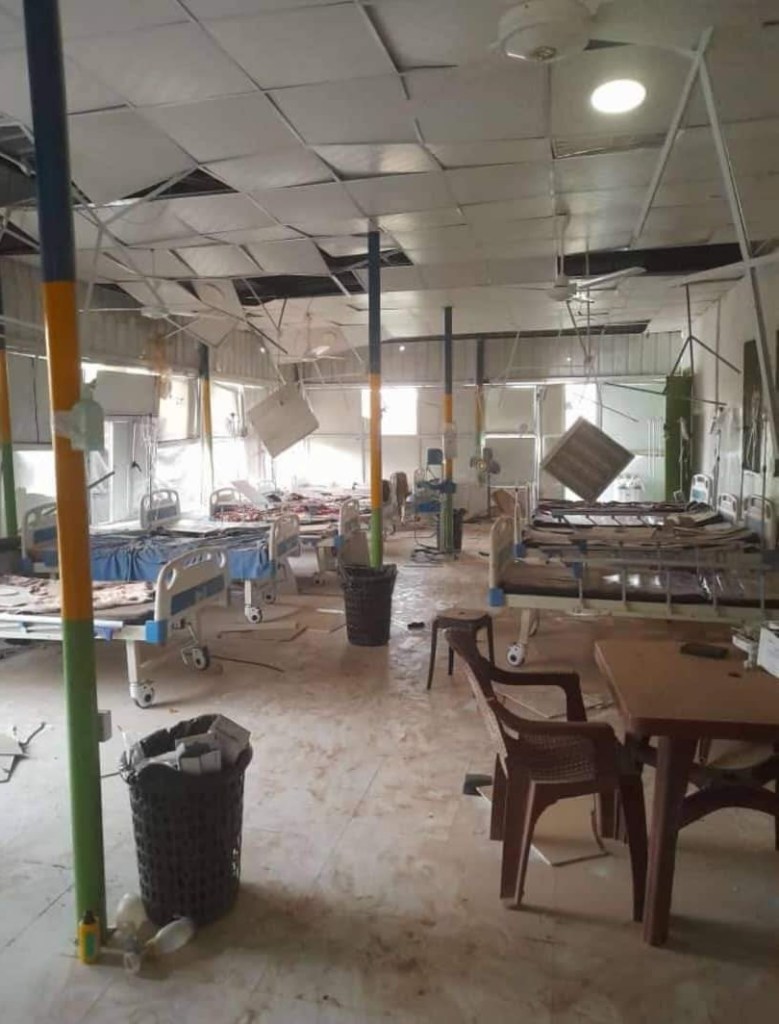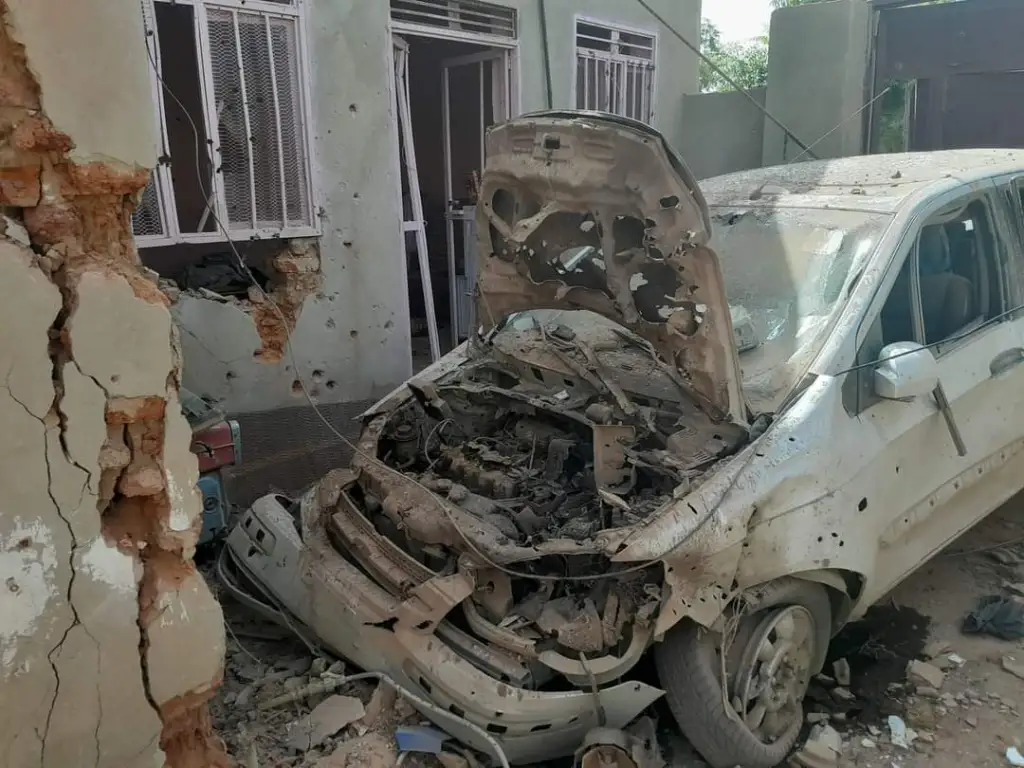New York, October 1, 2025—In Sudan’s vast western region of Darfur, journalists in El-Fasher are trapped under siege, enduring violence, hunger, and relentless bombardment alongside the people whose lives they report on.
The paramilitary Rapid Support Forces (RSF), a group that evolved from the notorious Janjaweed militias accused of atrocities in earlier Darfur conflicts, have been fighting the Sudanese army for control of Sudan since April 2023. In May 2024, they encircled the city, seeking to take control of the last major urban center in Darfur still under government control.
Satellite imagery from Yale’s School of Public Health shows the RSF has built earthen walls around almost the entire city. No international aid has reached El-Fasher in more than 16 months, with convoys carrying large-scale humanitarian supplies blocked or attacked by the RSF. In late September 2025, the Sudanese Armed Forces (SAF) carried out an airdrop, delivering very limited amounts of food and medicine into army-held parts of El-Fasher for the first time in five months.
Seven journalists interviewed by CPJ by phone — all currently or recently based in the city — described being cut off from food and aid, amid relentless shelling. Some were also targeted by RSF fighters with sexual violence and arbitrary detention because of their reporting.
“We are starved, we are hunted, but we still report. Our voices are the only thing left,” one journalist told CPJ, on condition of anonymity, citing fear of reprisals.
After the RSF lost control of the capital, Khartoum, in March, El-Fasher has become the epicentre of violence. The group seeks to control El-Fasher to consolidate its grip on Darfur, where it has been accused of committing acts of genocide.

The journalists told CPJ that RSF fighters often storm neighborhoods, raid houses, and use informants inside the city to identify them.
One said RSF fighters descended on her El-Fasher neighborhood in September, going door to door. When they entered her home and discovered she was a journalist, they ordered her family to leave, and three armed men beat and gang-raped her.
“This was not random violence. This was punishment because of my work,” she told CPJ, on condition of anonymity, citing fear of reprisals.
The Darfur Women Journalists Forum told CPJ it had recorded the rape of six female journalists since the start of the war, four of which occurred in El-Fasher. This is likely a vast underestimate of the true scale of the problem, given the stigma around sexual violence and lack of support available to survivors.
“I had no access to emergency contraception, no antibiotics, no painkillers,” the journalist said, as the destruction of hospitals and clinics has left Sudanese in need of emergency care with nowhere to turn.
“I was lucky to escape El-Fasher. But … in my current location, none of these things are available. I still don’t know if I am pregnant, and there isn’t a single doctor around to examine me,” she said.
“The psychological toll this has taken on me is unbearable, I carry its weight every single day,” she added.
‘Everyone is afraid to work’
Another journalist who spoke with CPJ on the condition of anonymity, for fear of reprisal, said she was detained by the RSF for 45 days in April and May 2025 for reporting on the siege.
“I was beaten, tortured, and threatened. They wanted me to stop reporting. It was some people who knew me who ratted me out to RSF. Informants are everywhere. They give journalists up in exchange for protection or money,” she said.
“I did eventually take a break from reporting, but funnily enough it wasn’t because of their intimidation, but rather because I was collapsing due to hunger,” she added.

Journalist Hamid Haroun said RSF fighters stopped him while he was walking home. They searched his phone and discovered his reporting on the paramilitary’s bombing of El-Fasher’s last remaining hospital.
“They detained me after they found out I was a journalist. They accused me of collaborating with the army. I was beaten, tortured, and questioned for 24 hours,” he said.
Two other journalists told CPJ that the RSF had circulated their names and faces online, sometimes accompanied by death threats.
“Everyone is afraid to work,” Lana Awad Hassan, who escaped El-Fasher six months ago after being shot in the leg by the RSF, told CPJ. “Even if you write a good report, you don’t publish it under your name. Both the RSF and the Sudanese army target journalists, but that does not stop us!”
Starvation as a weapon of war
Starvation is also being wielded as a weapon of war in El-Fasher, in a similar way to Gaza, where CPJ has documented reporters starved under blockade.
Since April 2023, more than 600,000 people have fled the city and surrounding camps, while those left behind face famine, according to the United Nations. Half the population of Sudan — 25 million people — are going hungry, in what the U.N. says risks becoming the world’s largest hunger crisis in recent history.
Markets and stores stand empty, pushing those trapped inside the city to make degrading choices to survive, like eating cattle feed.
“We live off ‘ambaz’ that we grind into porridge and stews. It’s meant for animals,” journalist Jehaad Ahmed Albadwe told CPJ, referring to a paste made from crushed peanuts fed to animals and often susceptible to fungal infections. “Families share a few spoonfuls of porridge, but they remain hungry.”
Journalists told CPJ they experienced severe diarrhea, malnutrition, and poisoning from eating “ambaz.” Albadwe recounted how an entire family died after consuming contaminated feed.
“People are literally dying from what they are forced to eat,” Albadwe said.
Journalist Muammar Ibrahim said he had not seen fruit in El-Fasher for over a year.
“Some families escape the siege by walking more than 60 kilometers through the desert, mostly at night to avoid fighters, to reach villages in search of millet and sorghum,” he told CPJ.
Prices for what little food remains are astronomical: a kilogram of sugar, costing 6 pounds in early 2023, the equivalent of about US$2 at that time, now costs 100,000 pounds, or US$28 according to current black-market exchange rates, the journalists said. Flour, rice, and powdered milk can reach 280,000 pounds (US$80) a kilo.
“Hunger is an infidel,” said one journalist, who declined to be named, using a common Arabic expression meaning hunger strips people of their patience, faith, and dignity.
“Sometimes you have to stop working, not because you want to, but because you can’t,” she said, describing how she collapsed from anemia. “I became too weak to walk.”
Lack of sanitary pads adds to female journalists’ shame.
“We use makeshift cloths from headscarves to make it through our [menstrual] cycles. It is humiliating, and you can’t stand in the street to report like this,” she said.

Determination to report
Despite the perils, the journalists in El-Fasher vowed to continue reporting, no easy feat with the city’s intermittent electricity and internet supplies.
“We can no longer cover the war live. We write, and when things calm down, we can publish, but the news is never timely. This is a tactic to silence us and keep El-Fasher away from the news,” Hassan told CPJ.
Their message to the world is clear.
“I chose to stay [in El-Fasher] so I can be the voice of my people who now have none. Journalism here is not just a job, it is a duty, even if it costs us our lives,” Ibrahim told CPJ.
“This is not only a war between the army and the RSF. It is a war against the truth. If the world continues to stay silent on Sudan, it will be complicit in burying El-Fasher and its people,” he said.
CPJ contacted the RSF through its website to request comment but received no response.
